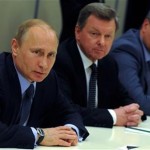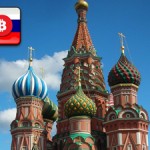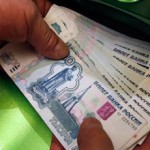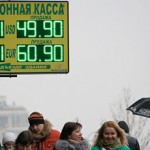Putin seeks to reassure world amid ‘perfect storm’
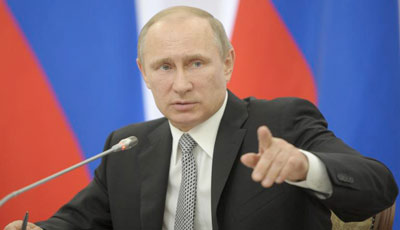
The Russian ruble strengthened against the dollar on Monday after President Vladimir Putin said there were no “fundamental economic reasons” for the currency’s slide, but analysts –and the country’s central bank — beg to differ.
Speaking at an Asia Pacific Economic Cooperation (APEC) summit on Monday morning, Putin said he was hopeful that speculation against the ruble would stop soon, Reuters reported.
The currency has slumped almost 30 percent against the greenback this year. A decline in oil prices and Russia’s conflict with Ukraine that have led to Western sanctions on Russia, which have hit the economy as well as investor confidence in the country.
Early on Friday, the ruble hit its weakest-ever level against the U.S. dollar, sliding to 48.6, before recovering to trade at 46.2 within a few hours.
In an effort to quell speculative trading, the head of Russia’s central bank, Elvira Nabiullina, said on Monday the bank had allowed the currency to float freely, abandoning its trading corridor, news agencies reported.
As the traders digested this news and Putin’s speech at the APEC summit, the ruble traded 2.8 percent higher, at 45.35 against the dollar.
Putin also said Russia and China intend to increase the amount of trade that is settled in yuan and ruled out capital controls for Russia, despite capital flight which has exacerbated the ruble’s decline.
He vowed to keep Russia’s debt levels down and said Russia planned to use part of its “sovereign reserves” to improve access to loans to draw foreign investment, but did not elaborate. “There will be no increase of sovereign debt,” Putin said. “We are planning to keep it at a safe, manageable level of below 15 percent of GDP.”
Putin’s attempts to reassure a global audience over the state of the Russian economy was a “sign of the seriousness of the situation that Putin feels the need to comment and try and re-assure on the exchange rate,” the head of emerging markets research at Standard Bank, said in a note Monday.
Timothy Ash said he would contend that low growth, lower oil prices, sanctions halting dollar liquidity and Russia’s ability to borrow, plus the security concerns in Ukraine “are all pretty fundamental factors”.
He said it was important that Putin had spoken, as “it suggests that officials will be more determined to defend the ruble again to support the boss’ view”.
Meanwhile the country’s central bank released a document on Monday in which it lowered its 2014 growth forecast to 0.3 percent and forecast 0 percent growth in 2015. It also estimated that capital flight had risen above forecasts to 128 billion in 2014.
According to a central bank monetary policy document quoted by news agencies, the decline in the oil price would continue to constrain economic growth and the bank expected sanctions on Russia to remain until the end of 2017.
Speaking on national television, central bank head Nabiullina said the recent forex volatility was not dictated by fundamentals, and the ruble was undervalued, Dow Jones reported.
A ‘perfect storm’ for Putin
Nicholas Spiro, head of Spiro Sovereign Strategy, warned on Monday that Russia was suffering “a perfect storm.”
“While the cumulative impact of falling oil prices, a tougher sanctions regime, a resurgent dollar and an economy that’s sliding into recession have taken a heavy toll on the ruble, the loss of confidence in Russian monetary policy is turning a somewhat manageable decline in the currency into a rout.”
Rather than just concentrating on economic reform, one portfolio manager said Russia needed to see political reform.
“The story in Russia is the same as the story in emerging markets and what we’re looking for in the medium to long-term is political reform,” Max King, portfolio manager at Investec Asset Management told CNBC Europe’s “Squawk Box” on Monday. “That will require political change such as [Prime Minister Dmitry] Medvedev’s replacement by [former Finance Minister Alexei] Kudrin. I think that would be the cue for a major improvement in Russia.”
Nomura’s senior political analyst Alastair Newton agreed that the political situation in Russia was driven as much by geopolitics as by economic considerations. “Even though its immediate intentions over Ukraine remain unclear, I believe that the Kremlin has opted for an anti-Western stance which makes it hard for it to deviate from its current trajectory.”
“I doubt that consequent economic stresses in Russia will put the regime at risk in the near to medium term; but they do, in my view, pose a potential long-term threat to stability.”
Reuters contributed to this story.
Source: CNBC – Putin seeks to reassure world amid ‘perfect storm’









